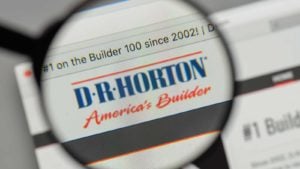
The issue with following popular stocks is that we buy high and hope to sell higher later. That goes against the common sense approach of buying stocks cheap and selling on the rebound. In the realm of homebuilding, a few picks may have become overvalued, leading to the rise of homebuilder stocks to sell.
There’s another issue when your stocks run too good — risk. If one stock accounts for a disproportionate amount of the gains in your portfolio, it also becomes its Achilles heel. A single stock moving back down again could plunge your entire account into the red, potentially wiping out years of capital growth. That’s why it may be prudent to examine these homebuilder stocks to sell to see if they put you in a precarious situation.
We might not be able to reactively time the market, but as investors, we can proactively trim our positions so that our portfolios remain balanced across different sectors. With this approach in mind, here are the top homebuilder stocks to sell.
PulteGroup (PHM)

PulteGroup (NYSE:PHM) primarily engages in the homebuilding business in the United States. The company acquires and develops land mainly for residential purposes and constructs various types of housing.
The stock has been in a massive bull run this year, seeing an 80% surge in its share price.
Last quarter, PHM stock reported strong Q2 2023 earnings, surpassing estimates with revenues of $4.19 billion and adjusted EPS of $3.00. The firm saw a decline in its backlog by 29.3% year-over-year (YoY), but new home orders increased by 23.8%, indicating strong demand. Home sales gross margin dropped to 29.6%, while Financial Services segment revenues rose 11.4% YoY.
These numbers logically predict a higher share price in the future. But in the short-term, it may be due for a correction — based on its technicals. The share price recently broke below some of its important moving averages and its momentum is currently to the downside. That helps make it one of the homebuilder stocks to sell.
D.R. Horton (DHI)

D.R. Horton (NYSE:DHI) is a company to examine through a macro lens. Although the business showed resilience by matching EPS to cash flow effectively, high mortgage rates and inflation could be a concern.
As America’s largest publicly traded home builder, DHI stock exceeded Wall Street’s Q3 earnings estimates with $3.90 a share and $9.7 billion in revenue, as reported by Barron’s. Despite raising its full-year outlook, the stock is down 5% this month, possibly due to investors taking profits after a strong first half of the year and a lack of immediate catalysts for further growth.
Indeed, there is some cause for concern for DHI when one examines its technicals. Similar to PHM stock, it also broke below its long-term moving averages. Analysts also predict that its EPS will shrink 5% over the next five years. Taken together, this paints a picture of potentially irrational exuberance on behalf of investors, making it one of those homebuilder stocks to sell.
NVR (NVR)

NVR (NYSE:NVR) is a prominent player in the U.S. homebuilding and mortgage banking sectors, known for its unique business model focusing on land optioning rather than land ownership. That strategy minimizes capital investment, reducing financial risk and enhancing liquidity.
NVR is a case of hold now, but be aware it could potentially rise to unsustainable levels later. It recently reported strong Q2 earnings, exceeding analysts’ expectations with an EPS of $116.54. Despite a revenue decrease of 12.5% YoY, the company announced a $500 million share buyback program. Meanwhile, investment firms like Smead Capital Management have increased their stake in the company.
What could be keeping a lid on its share price moving upward is our environment of high inflation and high-interest rates. But as we’ve seen in the first half of this year, that hasn’t stopped the market from taking excessive risks. It might be prudent to assess if and when NVR becomes an outsized part of an investor’s portfolio and assess if its valuation is logical as it moves higher. It’s hard to lose money by consistently taking profits, even only partial ones.
On the date of publication, Matthew Farley did not hold (either directly or indirectly) any positions in the securities mentioned in this article. The opinions expressed are those of the writer, subject to the InvestorPlace.com Publishing Guidelines.





